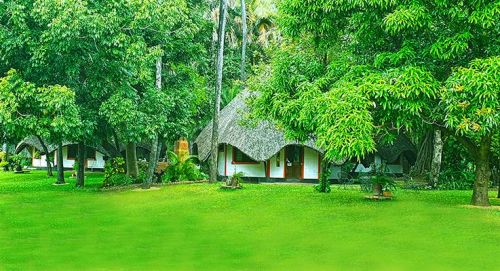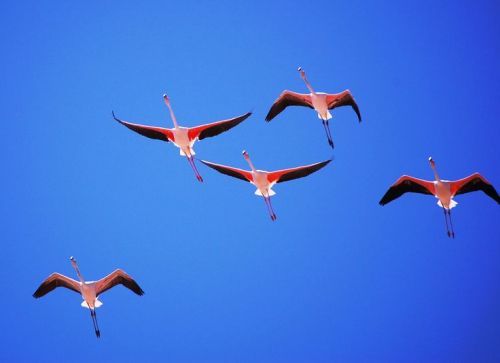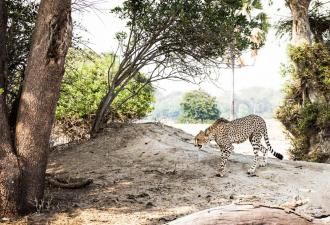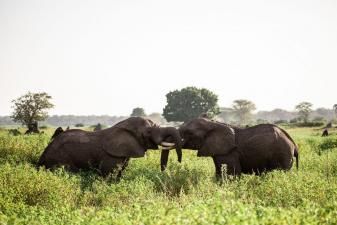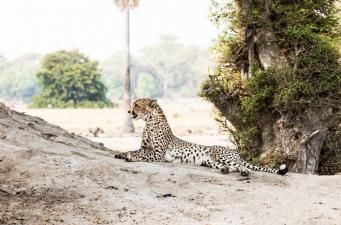Dzalanyama Forest Reserve, 60 km south-west of Lilongwe, is almost entirely covered with Brachystegia–Julbernardia woodland. It forms part of the Dzalanyama Range, a series of rocky hills running north-west–south-east along the border with Mozambique, which marks the watershed between Lake Malawi and the Zambezi river system. The eastern side of the reserve is relatively flat, at about 1,300 m. The hills to the west rise above 1,500 m with several peaks over 1,600 m. A few small patches (c.75 ha) of mid-altitude forest occur on the highest ridge near Kasito Rock. Dambos occur along many of the drainage lines, breaking the continuity of the woodland cover. A Pinus–Eucalyptus plantation has been established in the reserve and covers about 5% of the land area. On the Mozambique side, the woodland extends uninterrupted over a much larger area with little sign of human settlement evident.
For more information, click here.
Kasungu National Park is a national park in Malawi. It is located west of Kasungu, about 175 km north of Lilongwe, extending along the Zambian border. Kasungu National Park, established in 1970, is the second largest in Malawi at 2,316 km2 and lying at approximately 1,000m above sea level on average. It is located in the Central Region approximately 165 km north of Lilongwe.
Most years the park is closed during March, during the wet season. The park is warm from the months of September to May and cooler from June to August. During the summer months a large variety of birds migrate to the park and bird watching is common between June and September.
Kasungu is Malawi's second largest National Park after Nyika, and is located in the central region of the country. The landscape covers 2 000km (1243 miles) and consists of woodland and bush, grassland and rolling hills, with a small lake and a wide marshy river course. Hippos are established at the lake and an estimated 300 Elephant remain after serious poaching in the past.
Elephants (120), Buffalo, Zebra, Leopard, Jackal, Serval and antelope are all present here, as well as a wide variety of birds. Due to recent efforts, animal stocks and the accessibility of the Park have been improved, and it can now be toured in regular vehicles. In july 2022 Kasungu will receive an aditional 250 elephants , 80 buffalos, 120 impalas and other small animals from Liwonde National Park.
There is a lodge in the Park offering game drives and guided walks. Kasungu is only 160km (100 miles) from Lilongwe. The park also has many important Iron Age archaeological sites. The Park is Generally closed in March, as it is inaccessible due to the wet weather.
For more info click here
Kuti is an ideal getaway for peace and quiet and only a 1 hour drive from Lilongwe on the way to the lake – just before Salima Town – great for families – we have no predators so it is very safe to walk, run or cycle around. We have beautiful sunsets, and lovely viewing of animals. We have outstanding birds ( over 250 different species) at Kuti. Kuti runs entirely on Solar power, we are eco-friendly, we also have an indigenous tree reforestation program.
Lake Chilwa is the second-largest lake in Malawi after Lake Malawi. It is in eastern Zomba District, near the border with Mozambique. Approximately 60 km long and 40 km wide, the lake is surrounded by extensive wetlands. There is a large island in the middle of the lake called Chisi Island. The lake has no outlet, and the level of water is greatly affected by seasonal rains and summer evaporation. In 1968, the lake disappeared during exceptionally dry weather.
The Danish International Development Agency donated funds to ensure preservation of the lake and its wetlands, to improve the production of rice and other crops, and to help safeguard the habitat of the flora and fauna of the lake region.
The Lake Chilwa Basin Climate Change Adaption Programme (LCBCCAP) has been introduced to conserve the sensitive area, which is not only an important wetland for local fauna, but also a major source for fish products in the region.
Lake Chilwa was designated Malawi’s first Ramsar Site, Wetland of International Importance in 1997, and supports massive populations of important bird species including flamingos, pelicans and the localised black egret, while the baobabs on Chisi Island host the likes of trumpeter hornbill and various snake eagles.
Fore more info click here
Lake Malawi National Park is a 29.600 km2 national park at the southern end of Lake Malawi in Malawi. It is the only national park in Malawi that was created with the purpose of protecting fish and aquatic habitats. Lake Malawi National Park includes a fair amount of land, including a headland, the foreshore and several small rocky islands in Lake Malawi.
The Lake Malawi National Park incorporates the beautiful Cape Maclear, a World Heritage Site. The park lies in the south of the country, and is the world's first freshwater park. It includes the land area around the cape and bay, as well as the Lake and islands as far as 100 metres offshore. Lake Malawi is the number 2 deepst lake in Africa and number 6 deepest lake in the world (2316 feet or 706 meter).
These waters are an absolute delight for snorkelling and diving enthusiasts. There is also boating and canoeing on offer. There are 600 species of the colourful Malawi Cichlids, which are endemic here. This diversity of freshwater fish is unequalled in the entire world. The abundant freshwater fish will feed directly from your hand while snorkelling in Lake Malawi.
In the surrounding areas, various animals and birds can be found, including Baboons, antelope, Hyrax, Fish eagles, Hamerkops and Cormorants. There are a number of excellent places to stay, all of which offer many exciting activities. There are even some beautiful romantic island hideaways.
For more information, click here.
Lake Malawi National Park is a 29.600 km2 national park at the southern end of Lake Malawi in Malawi. It is the only national park in Malawi that was created with the purpose of protecting fish and aquatic habitats. Lake Malawi National Park includes a fair amount of land, including a headland, the foreshore and several small rocky islands in Lake Malawi.
The Lake Malawi National Park incorporates the beautiful Cape Maclear, a World Heritage Site. The park lies in the south of the country, and is the world's first freshwater park. It includes the land area around the cape and bay, as well as the Lake and islands as far as 100 metres offshore. Lake Malawi is the number 2 deepst lake in Africa and number 6 deepest lake in the world (2316 feet or 706 meter).
These waters are an absolute delight for snorkelling and diving enthusiasts. There is also boating and canoeing on offer. There are 600 species of the colourful Malawi Cichlids, which are endemic here. This diversity of freshwater fish is unequalled in the entire world. The abundant freshwater fish will feed directly from your hand while snorkelling in Lake Malawi.
In the surrounding areas, various animals and birds can be found, including Baboons, antelope, Hyrax, Fish eagles, Hamerkops and Cormorants. There are a number of excellent places to stay, all of which offer many exciting activities. There are even some beautiful romantic island hideaways.
For more information, click here.
Liwonde Narional Park is located in the south of Malawi bordered by the Shire River and is a must see Big 5 destination. The park was in total decline in 2015 when African Parks started managing the Park in partnership with the Department of National Parks and Wildlife. Between 2015-2019 Liwonde National Park was revived by translocating animals from Sout Africa and Majete Wildlife Reserve to Liwonde National Park. It was the largest elephant translocation in history (500!). Animal stocks include 17,000 (bi anual survey in 2021) animals such as Cheetas, Lions, African Wilddog and great many Hipos and Crocodiles, herds (in their hundreds) of Elephant, Buffalo Rhino, Zebra and other antelope. Liwonde National Park is also a Bird Lovers Paradise and the scenary is beautifull with dry Mopani Woodlands and Candelabra trees. White Palm Savannah and Baobabs are found on the floodplains of the river with dense vegatation at the banks.
There are great camps and lodges in Liwonde National Park. All kinds of animals often come up onto the lawns to feed at night so you can not roam around in the dark without local security. Guides can take you on safari walks, boat trips and(night) game drives. They are extremely knowledgeable and will give you an insight in the live of all animals, plants and trees that are in the park.
You can drive (into) the park yourelf, a vehicle with high clearance is recommended, 4 x 4 in rainy season. One can also arrive by boat from the other side of the Shire River. The park has a small airstrip.
For more information, click here.
An Impression
Many visitors come to hike up Nkhoma Mountain for a panoramic view of Malawi. Nkhoma Mountain is located behind Nkhoma Mission Hospital 50 kilometres south-east of Lilongwe. It is often clearly visible from Lilongwe.
Select a trail and try to stick close to the path (which can be covered with foliage during the rainy season). Some sections can be steep; wear appropriate footware. For some trails a local guide is advised.




